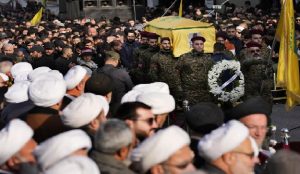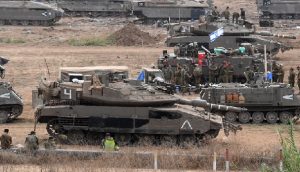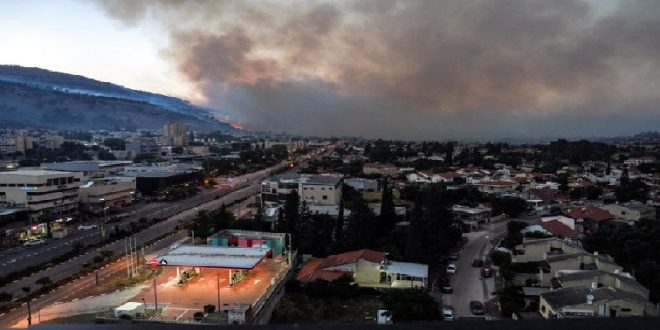10-06-2024
GAZA CITY/ JERUSALEM/ BEIRUT: Tensions and tit-for-tat attacks are escalating between Israel and the Lebanese group Hezbollah.
Since October 8, Hezbollah has engaged Israel in a low-level conflict to impede Israel’s war on Gaza, which has already killed more than 36,000 people.
 Civilians have been evacuated from villages on both sides of the border. Israel has targeted Lebanese villages with white phosphorus, while Hezbollah has targeted Israeli military installations with drones, guided missiles, and other weapons.
Civilians have been evacuated from villages on both sides of the border. Israel has targeted Lebanese villages with white phosphorus, while Hezbollah has targeted Israeli military installations with drones, guided missiles, and other weapons.
Over the last week, both sides have stepped up attacks as US President Joe Biden pushes for a ceasefire in Gaza.
Here’s all you need to know about whether Hezbollah and Israel will go to war.
Hezbollah is a Shia group that first emerged to confront Israel’s 18-year occupation of southern Lebanon, which began in 1982.
Backed by Iran, Hezbollah poses the largest military threat to Israel, according to Israeli and regional security experts.
In 2006, Hezbollah stood up to an all-out assault by Israel and has only grown stronger since then.
After the occupation of Lebanon ended, Israel and Hezbollah’s relationship remained fraught.
In 2006, Hezbollah ambushed Israeli soldiers, killing three and kidnapping two.
Israel responded by launching a war on Lebanon, reaching the capital Beirut.
There, Israel employed its “Dahiya Doctrine” named after a Beirut neighborhood Hezbollah controls which entails targeting civilian infrastructure.
The war lasted 34 days, killed 1,901 Lebanese people and displaced 900,000. About 165 Israelis were killed. However, Hezbollah was not destroyed.
 The group has since accumulated more sophisticated weapons and experience as it fought alongside the Syrian government during the country’s war, where it was accused of committing war crimes against Syrian civilians.
The group has since accumulated more sophisticated weapons and experience as it fought alongside the Syrian government during the country’s war, where it was accused of committing war crimes against Syrian civilians.
Since Israel launched its devastating war on Gaza after a Hamas-led attack on southern Israel on October 7, Hezbollah has fought a low-level conflict with Israel.
Fighting has followed what seem to be “rules of engagement” in which both sides try to avoid significant civilian casualties.
However, Israel has progressively struck deeper into Lebanon and killed many civilians.
On June 5, Hezbollah fired two suicide drones into an Israeli village that killed two people and injured 11.
Israeli firefighters also rushed to put out almost 100 fires that broke out from Hezbollah attacks.
Subsequently, Israel’s Prime Minister Benjamin Netanyahu said, “Israel is prepared for a very tense operation on its border with Lebanon”.
Israel’s far-right National Security Minister Itamar Ben-Gvir visited some of areas hit by the fires in the north and later told reporters, “It is unacceptable that a region in our country is targeted while Lebanon remains quiet. We must burn all of Hezbollah’s outposts. Destroy them.”
Despite Israel’s rhetoric, Imad Salamey, an associate professor of political science at the Lebanese American University, does not believe an Israeli invasion is imminent.
“Israel is facing significant challenges on multiple fronts, including regional security threats and internal political dynamics,” he told media.
“An invasion would likely result in severe international condemnation and strained relations with key allies, particularly the United States, which would complicate support,” he added. (Int’l News Desk)
 Pressmediaofindia
Pressmediaofindia




